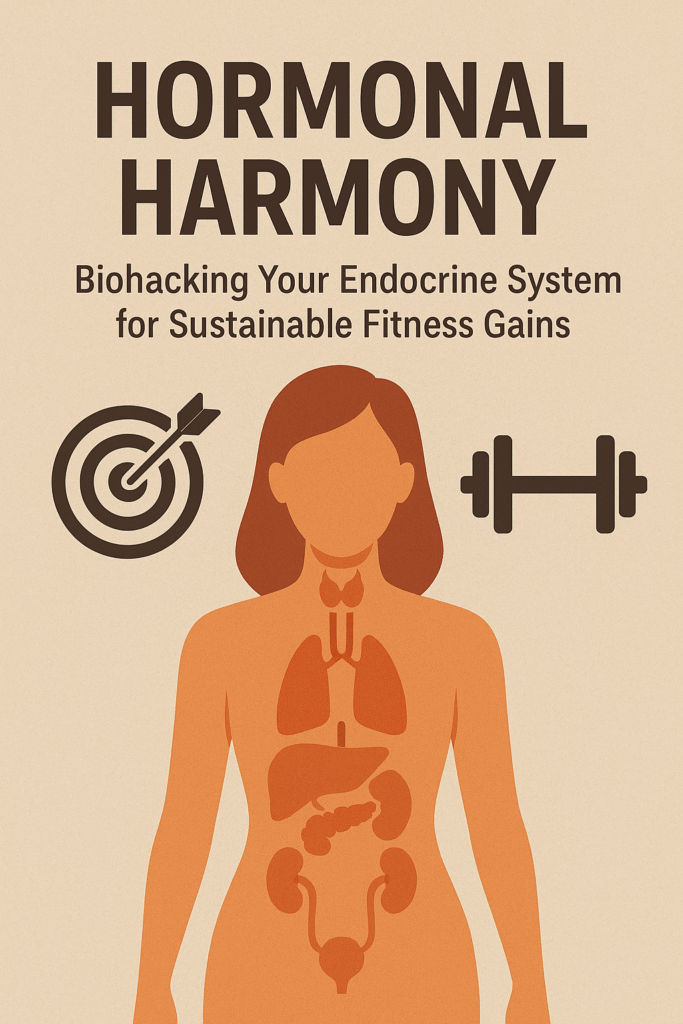In the intricate symphony of the human body, hormones act as the master conductors, orchestrating nearly every physiological process, from metabolism and mood to muscle growth and recovery. For athletes and fitness enthusiasts, achieving hormonal harmony is not just about feeling good; it’s about unlocking sustainable gains, optimizing performance, and ensuring long-term health. While often overlooked in favor of more overt training and nutritional strategies, the endocrine system—the network of glands that produce and release hormones—is a powerful lever for biohacking your fitness journey. This blog post will delve into the critical role of hormones in athletic performance, explore common hormonal imbalances that can hinder progress, and provide actionable biohacking strategies to optimize your endocrine system for peak physical and mental vitality.
The Endocrine System: Your Body’s Internal Communication Network
The endocrine system is a complex network of glands, including the thyroid, adrenal glands, pituitary gland, and gonads, that produce and secrete hormones directly into the bloodstream. These hormones act as chemical messengers, traveling throughout the body to regulate a vast array of functions essential for life and athletic performance:
- Metabolism and Energy Production: Hormones like thyroid hormones and insulin regulate how your body converts food into energy and stores it.
- Muscle Growth and Repair: Testosterone, growth hormone (GH), and insulin-like growth factor 1 (IGF-1) are crucial for muscle protein synthesis and tissue regeneration.
- Stress Response: Cortisol, often dubbed the
“stress hormone,” plays a vital role in the body’s response to physical and psychological stress.
- Fat Regulation: Hormones like leptin and ghrelin regulate appetite and fat storage.
- Sleep and Recovery: Melatonin and growth hormone are critical for restorative sleep and recovery processes.
When these hormones are in balance, your body functions optimally, supporting your fitness goals. However, imbalances can lead to a cascade of negative effects, hindering progress and impacting overall well-being.
Common Hormonal Imbalances Affecting Fitness
Several hormonal imbalances can significantly impede athletic performance, recovery, and body composition. Recognizing the signs and symptoms is the first step toward addressing them.
1. Cortisol Dysregulation (Chronic Stress)
While cortisol is essential for the body’s stress response, chronic elevation due to overtraining, insufficient sleep, or psychological stress can be detrimental. High cortisol levels can lead to:
- Muscle Breakdown: Cortisol is catabolic, meaning it breaks down tissues, including muscle, to provide energy. This can hinder muscle growth and lead to muscle loss.
- Increased Fat Storage: Especially around the abdominal area.
- Impaired Recovery: Suppressing the immune system and hindering tissue repair.
- Reduced Sleep Quality: Disrupting the natural sleep-wake cycle.
2. Low Testosterone (in Men and Women)
Testosterone is a key anabolic hormone, crucial for muscle growth, strength, and recovery in both men and women. Low levels can result in:
- Reduced Muscle Mass and Strength: Making it harder to build and maintain muscle.
- Increased Body Fat: Particularly around the waist.
- Decreased Energy and Libido: Impacting overall vitality and motivation.
- Impaired Recovery: Slowing down the repair of muscle tissue.
3. Thyroid Dysfunction
The thyroid gland produces hormones that regulate metabolism. Both an underactive (hypothyroidism) and overactive (hyperthyroidism) thyroid can impact fitness:
- Hypothyroidism: Can lead to fatigue, weight gain, reduced energy, and impaired recovery, making workouts feel sluggish and progress slow.
- Hyperthyroidism: Can cause rapid heart rate, weight loss, anxiety, and muscle weakness, making it difficult to sustain intense training.
4. Insulin Resistance
Insulin is a hormone that regulates blood sugar. Insulin resistance occurs when cells don’t respond effectively to insulin, leading to elevated blood sugar levels. This can result in:
- Reduced Energy: Cells struggle to absorb glucose for fuel.
- Increased Fat Storage: The body stores excess glucose as fat.
- Impaired Recovery: Chronic inflammation and reduced nutrient delivery to muscles.
Biohacking Your Endocrine System for Optimal Fitness
Optimizing your hormonal balance involves a holistic approach that integrates lifestyle, nutrition, and targeted interventions. The goal is to support your body’s natural hormone production and sensitivity.
1. Prioritize Quality Sleep
Sleep is perhaps the most powerful hormonal regulator. During deep sleep, growth hormone is released, crucial for muscle repair and fat metabolism. Insufficient sleep elevates cortisol and can negatively impact testosterone and insulin sensitivity. Aim for 7-9 hours of uninterrupted, high-quality sleep nightly. Implement a consistent sleep schedule, optimize your sleep environment (dark, cool, quiet), and avoid screens before bed.
2. Strategic Nutrition
Your diet directly influences hormone production and sensitivity.
- Balanced Macronutrients: Ensure adequate intake of healthy fats (avocado, nuts, seeds, olive oil) for hormone synthesis, quality protein for muscle repair, and complex carbohydrates for sustained energy.
- Micronutrient Density: Deficiencies in vitamins and minerals like Vitamin D, Zinc, Magnesium, and B vitamins can impair hormone function. Focus on a diverse diet rich in fruits, vegetables, and whole foods.
- Avoid Processed Foods and Excess Sugar: These can lead to inflammation and insulin resistance, disrupting hormonal balance.
- Gut Health: A healthy gut microbiome is crucial for nutrient absorption and can influence hormone metabolism. Incorporate fermented foods and fiber-rich foods.
3. Smart Training and Recovery
Exercise is a powerful hormonal modulator, but overtraining can be detrimental.
- Resistance Training: Stimulates the release of anabolic hormones like testosterone and growth hormone. Focus on compound movements and progressive overload.
- High-Intensity Interval Training (HIIT): Can also boost growth hormone and improve insulin sensitivity.
- Avoid Overtraining: Chronic, intense exercise without adequate recovery can lead to elevated cortisol and suppressed anabolic hormones. Incorporate rest days, active recovery, and listen to your body’s signals.
- Stress Management: Techniques like meditation, deep breathing, and yoga can help lower cortisol levels and promote a more balanced hormonal state.
4. Manage Environmental Toxins
Exposure to certain environmental toxins, known as endocrine-disrupting chemicals (EDCs), can interfere with hormone function. These can be found in plastics (BPA, phthalates), pesticides, and certain personal care products. Minimize exposure by:
- Using glass or stainless steel containers for food and water.
- Choosing organic produce when possible.
- Opting for natural and non-toxic personal care and cleaning products.
5. Targeted Supplementation (with caution)
While a holistic approach is paramount, certain supplements can support hormonal balance, but always consult with a healthcare professional before starting any new supplement regimen.
- Vitamin D: Crucial for testosterone production and overall endocrine health.
- Magnesium: Involved in over 300 enzymatic reactions, including those related to hormone synthesis and insulin sensitivity.
- Zinc: Important for testosterone production and immune function.
- Adaptogens: Herbs like Ashwagandha and Rhodiola can help the body adapt to stress and regulate cortisol levels.
Conclusion: The Symphony of Hormones for Lasting Fitness
Hormonal harmony is the silent conductor behind sustainable fitness gains and overall well-being. By understanding the intricate dance of your endocrine system and applying biohacking principles, you can move beyond temporary fixes and cultivate a body that functions optimally from the inside out. Prioritizing quality sleep, adopting strategic nutrition, engaging in smart training, managing stress, and minimizing environmental toxins are not just individual habits; they are interconnected levers that collectively fine-tune your hormonal symphony. Embrace this holistic approach, and you will not only unlock new levels of athletic performance and recovery but also lay the foundation for a lifetime of vibrant health and vitality. Your hormones are waiting to be harmonized—it’s time to conduct your masterpiece of fitness.
References:
[1] The Endocrine System. Hopkinsmedicine.org. Available at: https://www.hopkinsmedicine.org/health/wellness-and-prevention/the-endocrine-system
[2] Hormones and Exercise: The Role of the Endocrine System in Physical Activity. Nasm.org. Available at: https://www.nasm.org/resources/fitness-blog/hormones-and-exercise
[3] Overtraining Syndrome: Causes, Symptoms, and Treatment. Healthline.com. Available at: https://www.healthline.com/health/overtraining-syndrome
[4] Sleep and Hormones: A Complex Relationship. Sleepfoundation.org. Available at: https://www.sleepfoundation.org/sleep-deprivation/sleep-and-hormones
[5] Endocrine Disrupting Chemicals (EDCs). Niehs.nih.gov. Available at: https://www.niehs.nih.gov/health/topics/agents/endocrine/index.cfm


